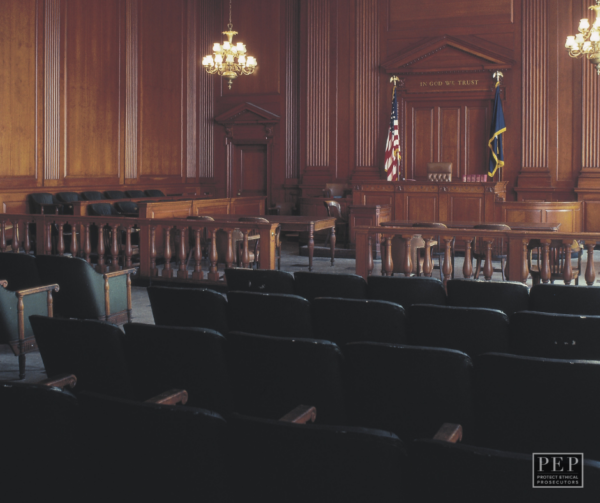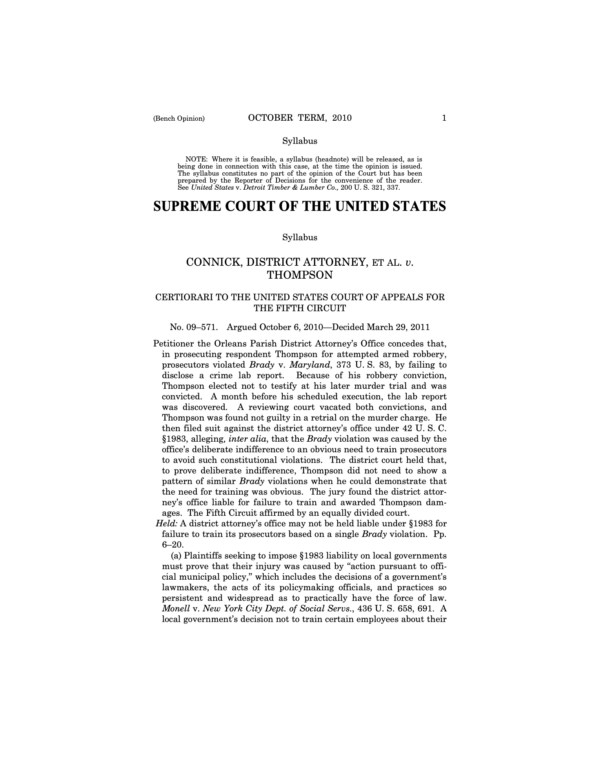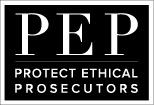Prosecutorial Immunity
What is prosecutorial immunity and how did we get here?
Absolute immunity is a legal doctrine that protects prosecutors from being sued for actions performed as part of their official duties.
It’s a near-total protection. Even if they violate the U.S. Constitution, intentionally or knowingly put forward false evidence, withhold or destroy evidence of innocence, or fabricate evidence, prosecutors cannot be sued by the individual they harm.
When was absolute immunity created?
The concept of absolute immunity is not found in the constitution or in any federal law. It was created by the U.S. Supreme Court in 1976 in the case Imbler v. Pachtman.

William Imbler was convicted in 1961 of murdering a local grocer in California. The prosecution’s case relied heavily on eyewitness testimony.
Imbler’s conviction was overturned eight years later when the court found several instances of misconduct, including that the prosecutor, Earl Pachtman, had knowingly used false, eyewitness testimony and buried evidence that supported Imbler’s alibi.
In 1972, Imbler filed a lawsuit in civil court claiming his constitutional right to due process had been violated. He argued that because the misconduct was intentional and egregious, Pachtman should be held personally liable for some $2.7 million in damages.
The Supreme Court disagreed. It acknowledged that misconduct may have occurred, but the independence and function of a prosecutor’s role outweighed a defendant’s right to due process.
When writing for the majority, Justice Lewis Powell argued that fear of litigation could hamper the work of honest prosecutors, outweighing the value of civil remedies for those harmed by misconduct.
From this case onward, absolute immunity has been interpreted broadly, shielding nearly all prosecutorial decisions related to charging, trial conduct, plea deals and more.
A pivotal decision: Connick v. Thompson
One of the most infamous examples of absolute immunity’s impact came in 2011 with Connick v. Thompson, when the Supreme Court overturned a Louisiana payout for damages in a wrongful conviction case.
 John Thompson spent 18 years in prison — 14 of them on death row — for a crime he didn’t commit. His conviction was overturned when it was revealed that prosecutors had withheld blood evidence proving his innocence, among other misconduct.
John Thompson spent 18 years in prison — 14 of them on death row — for a crime he didn’t commit. His conviction was overturned when it was revealed that prosecutors had withheld blood evidence proving his innocence, among other misconduct.
Acknowledging the precedent set in Imbler, Thompson sued the New Orleans District Attorney’s Office, led by Harry Connick Sr., arguing that a lack of training had led to repeated constitutional violations in his case. Thompson won, and a jury awarded him $14 million.
But in a controversial and narrow 5-4 decision, the Supreme Court overturned the verdict, ruling that the DA’s office could not be held liable unless Thompson could prove there was a “pattern of similar violations” showing deliberate indifference. Because Thompson’s case involved a single incident – albeit a catastrophic one – the Court found the office was not liable.
In her seething dissent, Justice Ruth Bader Ginsburg said that because withholding evidence may result in the conviction of an innocent person, “it is unconscionable not to impose reasonable controls impelling prosecutors to bring the information to light.”
This decision reaffirmed how impossible it is to hold prosecutors or their offices accountable, even when clear misconduct occurs.
Why total immunity for prosecutors?
In both decisions, justices argued that complete immunity was necessary to protect prosecutors, and by extension, the operations of the legal system as a whole.
For starters, the Court said, prosecutors must feel free to make tough calls at work without worrying about personal risk or frivolous lawsuits by every convicted defendant. The Court reasoned that there were enough protections to deter prosecutors from committing intentional misconduct; prosecutors could lose their law license or could be charged with crimes.
And since judges have immunity for their decisions, the Court believed prosecutors’ trial-related actions should be similarly protected.
But today, absolute immunity more often prevents victims of injustice from finding any meaningful remedy, and prosecutors are rarely disciplined by their offices or governing bodies that authorize law licenses.
With a growing spotlight on wrongful convictions and systemic failure, the legal community is increasingly calling for change.
The problems with prosecutorial immunity today
Over the decades, absolute immunity has been sharply criticized for creating a system where prosecutors can violate the constitution and commit irreparable harm without consequences.
Critics say some prosecutors may feel empowered to cut corners, particularly in high-pressure cases or politically motivated prosecutions, since they’re aware of their own immunity.
Absolute immunity also erodes the public’s trust in the system. When wrongful convictions are overturned due to misconduct, the public often learns that the prosecutor responsible will face no personal consequences, undermining faith in the legal system.
“Absolute immunity is a blank check for prosecutors to destroy lives with impunity,” said Iris Eytan, founder and CEO of Protect Ethical Prosecutors, a nonprofit fighting against prosecutorial misconduct. “There’s no deterrent, no accountability and no justice for victims.”
“Absolute immunity is a blank check for prosecutors to destroy lives with impunity. There’s no deterrent, no accountability and no justice for victims.”
Iris Eytan, founder and CEO of Protect Ethical Prosecutors
What does reform look like?
Nearly everyone agrees the system would benefit from oversight committees that can track incidents of misconduct, identify repeat offenders and discipline violators outside of bar associations.
Legal scholars, former Governors, lawmakers, judges and advocacy groups on all sides of the political spectrum advocate for reform. Some states have considered reducing immunity – or eliminating it altogether.
- New York created such a committee in 2018, but lawsuits filed by prosecutors prevented it from reviewing cases until 2025.
- California passed a law in 2021 that increases transparency of police and prosecutorial records, though it has no independent commission on the state level.
- In 2005, Texas created a forensic science commission, which is primarily focused on forensic errors but has exposed prosecutorial practices related to faulty science.
Eytan said this type of reform may create a slight deterrent, but it does not provide recourse for victims.
“We need a system that holds everyone — prosecutors included — accountable to the law,” Eytan said. “Without consequences, there’s no justice. Without justice, there’s no rule of law.”
The future of prosecutorial immunity
Absolute immunity was created to protect prosecutors from being chilled by the fear of lawsuits, but over time, it has become one of the most controversial legal doctrines in American law.
As wrongful convictions and prosecutorial scandals continue to come to light, the debate grows louder about whether the legal system can remain fair and accountable while sweeping protections exist.
Protect Ethical Prosecutors is fighting back against prosecutorial misconduct. Join us to demand accountability and protect the integrity of our legal system.

